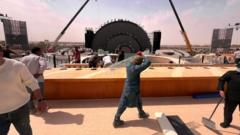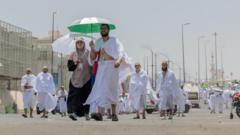Reports indicate alarming safety failures, with calls for accountability and improved protection against preventable workplace accidents exacerbating the human cost of development.
Surge in Migrant Worker Deaths in Saudi Arabia Ahead of World Cup, Warn Human Rights Groups

Surge in Migrant Worker Deaths in Saudi Arabia Ahead of World Cup, Warn Human Rights Groups
Human rights organizations raise alarms over the rising fatalities among migrant workers in Saudi Arabia's construction sector as preparations for the 2034 World Cup ramp up.
Human rights groups are sounding the alarm about a worrying increase in deaths among migrant construction workers in Saudi Arabia as the nation gears up to host the World Cup in 2034. Investigations from Human Rights Watch and FairSquare released today reveal that laborers are already succumbing to preventable workplace accidents, with fatalities often misclassified as natural causes, denying families of workers access to compensation for their losses.
Minky Worden, director of Global Initiatives at Human Rights Watch, noted the potential for the upcoming tournament to carry an unprecedented human cost, as millions of migrant workers endeavor to construct an expansive infrastructure which includes 11 new stadiums, an extensive rail and transit network, and 185,000 hotel accommodations.
The announcement follows a recent visit by FIFA President Gianni Infantino, alongside former U.S. President Donald Trump, to Saudi Arabia for an investment forum. FIFA insists on its commitment to human rights, yet critics argue that it has not adequately responded to the plight of migrant workers, particularly after the tragic incidents leading up to the 2022 World Cup in Qatar.
Due to limited access for human rights organizations in Saudi Arabia and the prohibition of labor unions, collated data on the true scope of migrant fatalities remains elusive. However, interviews conducted with families of 31 workers from Bangladesh, India, and Nepal highlight the severe risks faced by laborers, who have suffered critical injuries, including falls, being crushed or electrocuted. The heat presents another significant hazard, with construction activities intensifying in anticipation of the World Cup.
Recent reports noted the death of Pakistani foreman Muhammad Arshad, who fell from a stadium construction site in Al Khobar, marking the first recorded fatality linked to World Cup preparations. Meanwhile, the Saudi government has touted successes in improving workplace safety, while FIFA commended new labor reforms since 2018. Still, the global construction workers' union, BWI, warns of an increasing number of preventable accidents driven by negligence and lack of accountability.
FairSquare's co-director, James Lynch, criticized the inadequacies of the Saudi medical system to investigate migrant worker deaths properly, suggesting a pervasive disregard for worker rights and safety. The current conditions force countless young men into a perilous labor market, where many families face the heartbreak of losing fathers without closure on the circumstances of their deaths.
In response, FIFA has announced plans to introduce a workers' welfare system, although specifics remain vague. Human Rights Watch continues to advocate for comprehensive investigations into migrant deaths and insists that victims' families receive appropriate compensation and respect.
The BBC has reached out to Saudi authorities for further comment on this troubling situation.
Minky Worden, director of Global Initiatives at Human Rights Watch, noted the potential for the upcoming tournament to carry an unprecedented human cost, as millions of migrant workers endeavor to construct an expansive infrastructure which includes 11 new stadiums, an extensive rail and transit network, and 185,000 hotel accommodations.
The announcement follows a recent visit by FIFA President Gianni Infantino, alongside former U.S. President Donald Trump, to Saudi Arabia for an investment forum. FIFA insists on its commitment to human rights, yet critics argue that it has not adequately responded to the plight of migrant workers, particularly after the tragic incidents leading up to the 2022 World Cup in Qatar.
Due to limited access for human rights organizations in Saudi Arabia and the prohibition of labor unions, collated data on the true scope of migrant fatalities remains elusive. However, interviews conducted with families of 31 workers from Bangladesh, India, and Nepal highlight the severe risks faced by laborers, who have suffered critical injuries, including falls, being crushed or electrocuted. The heat presents another significant hazard, with construction activities intensifying in anticipation of the World Cup.
Recent reports noted the death of Pakistani foreman Muhammad Arshad, who fell from a stadium construction site in Al Khobar, marking the first recorded fatality linked to World Cup preparations. Meanwhile, the Saudi government has touted successes in improving workplace safety, while FIFA commended new labor reforms since 2018. Still, the global construction workers' union, BWI, warns of an increasing number of preventable accidents driven by negligence and lack of accountability.
FairSquare's co-director, James Lynch, criticized the inadequacies of the Saudi medical system to investigate migrant worker deaths properly, suggesting a pervasive disregard for worker rights and safety. The current conditions force countless young men into a perilous labor market, where many families face the heartbreak of losing fathers without closure on the circumstances of their deaths.
In response, FIFA has announced plans to introduce a workers' welfare system, although specifics remain vague. Human Rights Watch continues to advocate for comprehensive investigations into migrant deaths and insists that victims' families receive appropriate compensation and respect.
The BBC has reached out to Saudi authorities for further comment on this troubling situation.




















